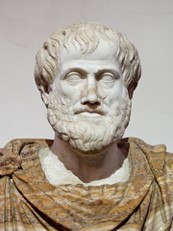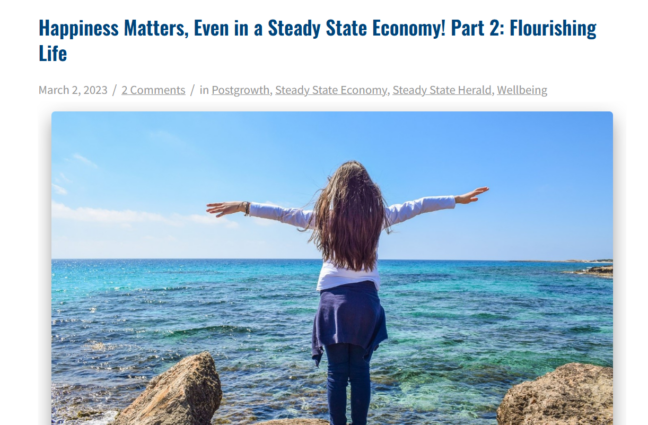This post was originally published on the Steady State Herald blog, 2nd March 2023.
Happiness matters. The quest for happiness is an elementary life force and an inherent part of steady state economies. Many fear that reducing material consumption will bring a decline in happiness. We do not like to lose what we already have. Recession and income loss tend to hurt.
On the other hand, voluntary adjustment of priorities in life may boost well-being, as a simpler life might deliver more of what many are missing: health, time for ourselves and loved ones, community, creative pastimes, arts, culture, sports, spiritual practices, and more generally, a sense of meaning. To achieve a profound transformation of societal systems, we need to move beyond analysing the causes and signs of the social and ecological crisis and beyond describing the destructive patterns of our economies. A positive narrative is essential for inspiring and motivating individual and collective action.

Connection to nature can enhance happiness. (Bonnie Gortler (3.0 BY NC ND)
Part of such a positive narrative could be “sustainable hedonism” and “flourishing life.” In last week’s Herald, I explained how we can adjust the way we seek pleasure and cultivate “sustainable hedonism” that goes beyond the egoistic, short-term, pleasure-seeking “radical hedonism,” the hedonism we may think of when hearing the term. We may all become better hedonists (a term that was not negative to its creators, the ancient Greeks), seeking pleasure without causing harm to ourselves or to others. But helpful though sustainable hedonism may be, it is not sufficient for experiencing lasting happiness. In this second part, I explore the wider issue of happiness. Based on my recent book Sustainable Hedonism. A Thriving Life That Does Not Cost the Earth (Bristol University Press, 2021), I present the notion of flourishing life and show why it may be the right approach to happiness.
Why Question our Understanding of Thriving and Happiness?
A thriving life and happiness are often approached unconsciously and without awareness, yet they deeply affect our daily experiences as well as our long-term strivings. Happiness is both personal and cultural: We feel what we feel, but our experience is deeply intertwined with the notions of the good life held by our families, communities, and society, as well as by the worldview advanced by mainstream economics.
Modern societies have embraced notions of a good life, and strategies for achieving it, that are often fundamentally flawed. The most obvious sign that these strategies are off-track is the dire state of our ecological system, the very foundation of our lives on this planet. Our personal convictions regarding success and a good life may also be far from optimal. Many of us work hard, putting forth incredible effort, yet our goal of happiness seems to evade us like a fata morgana, a mirage. Doing more of what has not worked to date is unlikely to provide a breakthrough. We need to explore the alternatives available to us as individuals and as societies.
How can we achieve lasting happiness, satisfaction, and well-being without causing irreversible harm on a global scale? What is the mindset that helps us create a better world that supports human thriving as well as ecological regeneration?
Happiness as Flourishing Life
Aristotle and his notion of “eudaimonia,” often translated as “flourishing life,” is experiencing a renaissance in psychological research. It is often understood as a meaningful life, something many of us long for and whose absence brings us suffering. We wish to contribute to something larger than ourselves, we want to feel that our life matters and that we can make a difference in some way.
I argue that the notion of flourishing life has even more to offer today than it did in ancient Greece. It can be an inspiration for how to live a life that is not harmful and does not threaten future generations. It is also a life where we are powerful, because we are able to take meaningful action and we can experience our autonomy and competence in doing so.
Aristotle held that happiness cannot depend on the lucky constellation of external events, either. It cannot be the gift of gods, as it is far too precious. ‘To entrust to chance what is greatest and most noble would be a very defective arrangement,’ Aristotle wrote. This may run counter to the trust we place in chance to bring happiness: Many of us expect happiness from winning the lottery, for example, or meeting by accident the perfect partner. We may hope that fate, life or God (depending on our worldview) grants us happiness in a fair world. Aristotle, by contrast, emphasizes the role each of us plays in creating our own happy life.

Happiness is not a solo pursuit. (Bust of Aristotle, Palazzo Altemps, Rome)
Happiness—in his understanding, the activity of the soul—is based on action. Thus, we can all act and do our part. This is confirmed by recent findings in positive psychology, which holds that we can cultivate our skills for a happy life, and offers examples of how to do so: Be grateful, practice mindfulness, exercise, connect to nature, and maintain spiritual practices, to name just a few.
Aristotle goes beyond the contemporary approach of positive psychology in several ways. His notion of happiness is not an individualistic endeavor, but is relational: A person cannot be happy (or wealthy or powerful) if their gifts are not shared with friends in the community. Our happiness cannot be separated from the happiness of others. Aristotle holds the same about wealth: wealth is worth nothing if it is not enjoyed together with others.
Happiness as Soulful Action
Aristotle stands at a critical distance from desires and pleasure. Pleasure is far from the most precious thing in life, according to the philosopher; therefore he is not considered to be a hedonist.. Rather, the ultimate good is happiness, “eudaimonia,” where “eu” stands for good and “daimon” refers to a spirit. In the ancient Greek worldview, good spirits maintained the order of the cosmos. The task of humans was to create this order in themselves as well. Empirical evidence from psychological research also confirms that eudaimonic actions are conducive to health and well-being.
This sort of happiness unfolds over the course of one’s life, based on conscious actions and the cultivation of virtues. It is not simply a momentary feeling, a passing state of euphoria, but an enduring state of being. In a flourishing life, the sense of happiness arrives as a consequence of a person becoming more virtuous and living well.
Happiness comes from “the activity of soul,” holds Aristotle. We do not seek happiness directly; instead, happiness a reward that results from right actions.
Persistence in Practicing Virtues
Much of the ancient wisdom about virtues can also be adapted to our contemporary social reality. I argue in my book that cultivating the virtues of courage, temperance, good temper, and practical wisdom can yield more conscientious consumption, lifestyle adjustments, engagement in environmental action and alliances, and ultimately an increased ability to act in alignment with one’s deepest needs and desires.

Developing virtues is key to a happy and caring life. (Manfred Legasto Francisco)
A brilliant musician or a top athlete cannot be the master of their art overnight. Similarly, for the development of specific virtues, we need commitment, sustained personal effort, and a supportive community. Our schools as well as alternative education opportunities could create safe space for experiential learning, where we not only speak about our strivings for a good life, but explore our patterns and our future flourishing selves with our bodies, engaging our emotions and intuitions as well.
The arts, dance, or drama can facilitate playful explorations on serious matters. Personally, I apply psychodrama as a tool for experiential learning in groups for changemakers, who may feel stuck or who just feel that the burden of responsibility weighs too heavy on their shoulders. In the “theatre of the soul” (the literal translation of the Greek word “psychodrama”), participants recognize their power and their role in creating a thriving life for themselves and for all.

Author, in orange scarf, leading a psychodrama workshop. Photo: Nora Varga, Love and Lights photography
In sum, I argue that the Aristotelian notion of happiness as flourishing life could reveal a way of life that leads to a state of lasting happiness without harming ourselves, others, or the planet. Flourishing life is based on soulful action, on the cultivation of virtues and wisdom. It is developed in friendships and community. Happiness is thus not simply feeling good, but doing good.
The philosophical and psychological notion of happiness can inspire our understanding, but for a profound transformation we need to explore and practice thriving in our own lives. Flourishing life could offer an alternative narrative regarding success and the good life that brings more happiness, rather than less, over the long run in a steady state economy. And while we may not find our ultimate path, this enquiry would, I argue, take us a long way toward it, leaving us and the planet better off.
